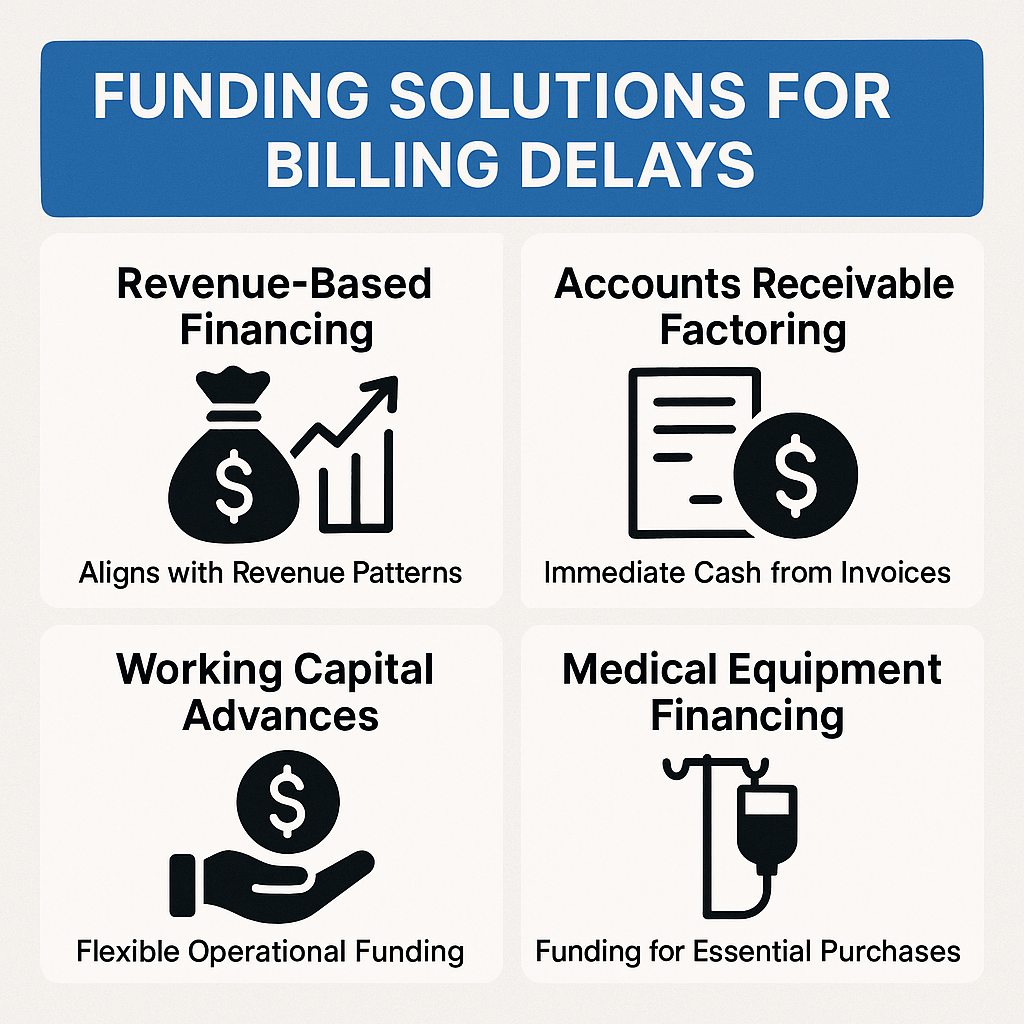Managing Cash Flow Challenges in Healthcare Practices
Healthcare providers often face significant cash flow challenges due to the complex nature of medical billing and insurance reimbursements. When billing delays occur, clinics may struggle to maintain operational liquidity while waiting for payments that could take weeks or months to arrive. This creates a challenging situation where patient care continues, but the revenue to support that care gets delayed through no fault of the practice.
The impact of these delays extends beyond simple accounting issues. Staff payroll, medical supplies, equipment maintenance, and facility costs don't pause while waiting for insurance companies to process claims. Finding effective funding for clinics facing billing delays becomes crucial for maintaining quality patient care and keeping practices financially healthy during these inevitable gaps in cash flow.
Understanding Healthcare Billing Delay Challenges
Healthcare billing delays create unique financial pressures that understanding these challenges helps identify the most appropriate funding solutions. The complexity of medical billing often results in extended payment cycles that can strain even well-established practices.
- Insurance processing delays: Claims may take 30-90 days or longer to process, creating significant gaps between service delivery and payment receipt
- Claim rejections and resubmissions: Denied claims require additional time for corrections and reprocessing, extending the already lengthy payment timeline
- Prior authorization requirements: Some treatments require pre-approval, which can delay both service delivery and subsequent billing processes
- Seasonal payment fluctuations: Insurance cycles may create predictable but challenging periods of reduced cash flow throughout the year
Types of Funding Solutions Available

Various funding options exist specifically designed to help healthcare practices manage billing delays and maintain operational stability. Each type of funding solution offers different advantages depending on the clinic's specific needs and circumstances.
- Revenue-based financing: Advances based on future receivables that align with the clinic's revenue patterns and billing cycles
- Accounts receivable factoring: Converting outstanding invoices into immediate cash while transferring collection responsibilities to the funding provider
- Working capital advances: Flexible funding that provides immediate cash to cover operational expenses during billing delays
- Medical equipment financing: Specific funding for essential medical equipment purchases that might otherwise be delayed due to cash flow issues
Maintaining Payroll Stability During Delays
Payroll stability represents one of the most critical aspects of managing billing delays, as healthcare staff expect consistent compensation regardless of insurance payment timing. Reliable funding solutions can help ensure that payroll obligations are met consistently.
- Predictable payment schedules: Staff members rely on regular paychecks, and delays can impact morale and retention in competitive healthcare job markets
- Benefits continuation: Health insurance, retirement contributions, and other benefits must continue even during cash flow challenges
- Overtime and specialty pay: Emergency situations may require additional staffing costs that coincide with billing delays
- Recruitment and retention: Consistent payroll helps maintain staffing levels necessary for quality patient care and operational efficiency
Strategies for Operational Liquidity Management
Effective operational liquidity management involves developing comprehensive strategies that address both immediate funding needs and long-term financial planning for healthcare practices.
- Cash flow forecasting: Developing accurate predictions of incoming and outgoing funds helps identify potential shortfalls before they become critical
- Expense prioritization: Understanding which operational costs are most critical during cash flow constraints helps optimize limited resources
- Vendor relationship management: Maintaining good relationships with suppliers may provide flexibility during temporary cash flow challenges
- Emergency fund development: Building reserves during strong cash flow periods can provide buffers during billing delays
Steps to Secure Appropriate Funding
Securing funding for clinics facing billing delays typically involves a systematic approach that demonstrates the practice's stability and repayment capacity. Following these steps may improve the likelihood of obtaining suitable financing terms.
- Document financial history: Gather comprehensive records showing historical revenue patterns, typical billing cycles, and past payment performance from insurance providers
- Calculate funding requirements: Determine the specific amount needed to bridge billing delays while maintaining normal operations and service quality
- Research funding providers: Identify lenders or funding companies that specialize in healthcare financing and understand medical billing cycles
- Prepare application materials: Compile necessary documentation including financial statements, accounts receivable aging reports, and operational projections
- Compare terms and conditions: Evaluate different funding options based on cost, repayment structure, and alignment with expected cash flow patterns
Financial Planning for Future Billing Cycles
Long-term financial planning helps healthcare practices better prepare for future billing delays and reduces dependence on emergency funding solutions. Developing proactive strategies may improve overall financial stability.
- Implement billing process improvements: Streamlining billing procedures and reducing claim rejection rates can accelerate payment cycles and improve cash flow predictability
- Diversify revenue streams: Developing multiple income sources may help reduce dependence on any single payment channel or insurance provider
- Establish credit facilities: Pre-approved credit lines provide access to funds during billing delays without requiring new applications during cash flow crunches
- Monitor industry trends: Staying informed about insurance industry changes helps anticipate potential impacts on payment timing and billing processes
- Build strategic reserves: Gradually accumulating cash reserves during strong periods creates internal funding sources for managing future delays
Managing billing delays represents an ongoing challenge for healthcare practices, but appropriate funding solutions can help maintain operational stability and quality patient care. By understanding available options and implementing strategic financial planning, clinics can better navigate the complex landscape of medical billing and insurance cycles.
The key lies in finding funding solutions that align with the unique cash flow patterns of healthcare practices while supporting long-term growth and stability. Whether through revenue-based financing, accounts receivable factoring, or other specialized funding options, the right approach can help transform billing delays from operational crises into manageable business challenges.

.png)






